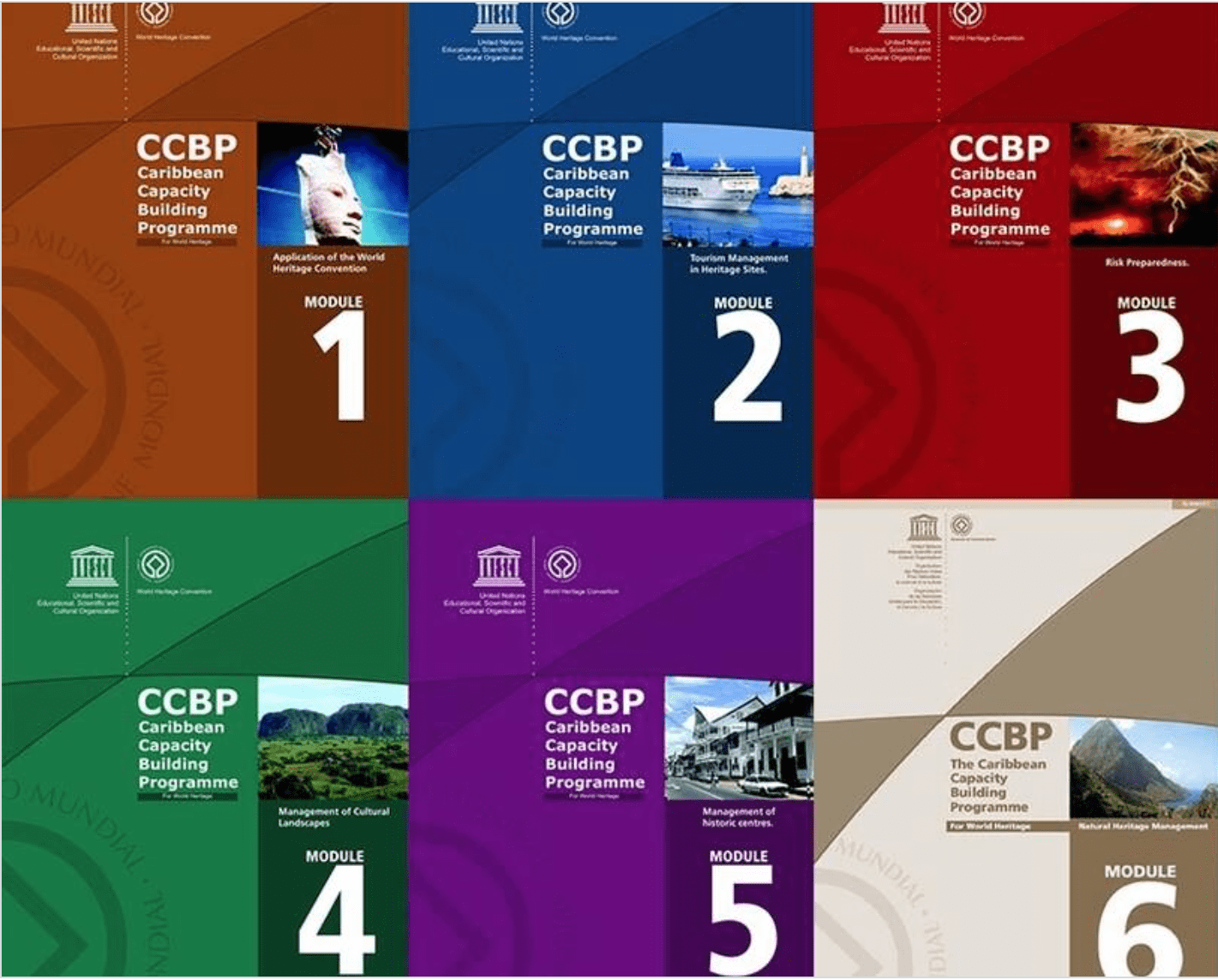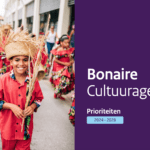The Caribbean Capacity Building Programme (CCBP) is a long-term training program focusing on cultural heritage management and aiming to create a Caribbean network of heritage experts. They, in turn, can share knowledge, know-how, and expertise on the modus operandi of the World Heritage Convention and on heritage management in general. In 2011 this course took place in Curaçao and was attended by around 20 architects and heritage professionals from the region, representing Curaçao, Bonaire, Aruba, St. Maarten, Suriname, Guyana, St. Lucia, St. Kitts, Trinidad, the Virgin Islands, and Haiti.
The CCBP was conceived to respond to the needs identified in the Latin America and the Caribbean Periodic Report which showed that most of the Caribbean State Parties still lack the capacity and expertise needed to enable full protection and management of the present World Heritage sites (18) and to identify new World Heritage sites. The CCBP was endorsed by the World Heritage Committee in 2004 as part of the Caribbean Action Plan for World Heritage.
The CCBP is composed of a core and mandatory training module on the Application of the World Heritage Convention and a series of other modules focusing on the various aspects of management (tourism, historic centers, risks, cultural landscapes, and natural heritage). Each module lasts 30 hours and encompasses practical exercises, analysis of regional case studies, and discussions. The training modules are available in 3 languages (English, French, and Spanish).
Module 1: Application of the World Heritage Convention
Pina Grazia Piras
Module 2: Tourism Management in Heritage Sites
Ricardo Nuñez Fernandez
Module 3: Risk Preparedness
Herbert S. Stovel
Module 4: Management of Cultural Landscapes
Isabel Rigol
Module 5: Management of historic centers
Cristina Iamandi
Module 6: Natural Heritage Management
Enrique H. Hernández
Relevant learning objectives/final attainment levels
<h4>Module 1:</h4>
After a formal course opening, participants should be asked to introduce themselves. They should convey their professional background, their working situation at present and what they hope to learn during the course. The course instructor should record the objectives expressed by participants and then relate these to the module objectives.
The basic learning objectives for the module are the following:
<ul>
<li>Participants become able to relate and apply the modules’ concepts to concrete working situations (e.g. elaboration of national inventories, asesesment of authenticity and integrity, selection of World Heritage Criteria, preparation of world heritage nomination, site interpretation and analysis etc);</li>
<li>Participants achieve ability to analyse, to assess and to develop policies and strategies to better identify, preserve, manage and monitor heritage sites;</li>
<li>Participants gain understanding of the rich and varied Caribbean heritage and become aware of its cultural significance;</li>
<li>Participants learn how to deal with critical and common issues related to the dynamics between conservation and development and are able to find viable solutions for specific projects and case studies.</li>
</ul>
<h4>
Module 2</h4>
The module has the perspective of sensitizing and training heritage site managers and tourism actors that operate in the Caribbean region about the links between heritage and tourism, as well as activating that which can be derived from it. It seeks to show that the potentials of heritage can be efficiently utilized for the economic and socio-cultural development of the countries of the region, especially receiving communities. For that, the module will provide participants with the theoretical-practical tools, experiences and discussion elements to make the symbiosis between heritage and tourism sustainable.
<h4>
Module 3</h4>
After a formal course opening, participants should be asked to introduce themselves. They should convey their professional background, their working situation at present and what they hope to learn during the course. The course instructor should record the objectives expressed by participants and then relate these to the module objectives.
Basic learning objectives for the course are the following:
<ul>
<li>Participants will gain familiarity with the basic concepts in the risk preparedness field and be able to relate these to the basic concepts in the heritage conservation field</li>
<li>Participants will become aware of the basic building blocks available in putting together effective risk preparedness strategies for cultural heritage, and the advantages and disadvantages of each, in a variety of cultural heritage contexts and in relation to a diverse set of hazards</li>
<li>Participants will learn to apply their understanding of the basic elements of effective risk preparedness strategies for cultural heritage, in real life contexts</li>
<li>Participants will return home enabled to apply a “change agenda” built in the course and meant to be applied in real life working situations</li>
</ul>
<strong>Other course objectives may include:</strong>
<ul>
<li>Testing course materials and objectives for later use in other contexts</li>
<li>Building a permanent network of those in a region interested in pursuing the subject of the course</li>
</ul>
<h4>
Module 4</h4>
Module 4, Management of Cultural landscapes, sets out to train the people who make decisions on this type of heritage in the specifics of this category, their identification, protection and sustainable use. Also, it aims to create a consciousness of the potential exceptional universal value that many of these cultural landscapes present with a view to their nomination as World Heritage. On the other hand, the program also seeks recognition and protection for those landscapes that, although they do not have a significance that extends beyond the local borders, are important for a country or locality.
<h4>
Module 5</h4>
The aim of the training module proposed below is to provide the participants with the necessary basic knowledge about management of historic cities and proper methodology to develop and implement management plans for historic cities.
<ol>
<li>To provide students from diverse backgrounds with a basic knowledge of the management of historic cities and specifically of management planning including concepts, perspectives and methodologies associated with architectural and urban heritage description, interpretation and analysis.</li>
<li>To improve the effectiveness of the conservation movement in the Caribbean by updating qualified professionals in conservation management planning, interpretation and administration, and to foster the effectiveness of this movement by increasing community awareness of the aims and techniques of urban conservation management.</li>
<li>To inform participants about the international charters and recommendations, and the main issues of the current debate in the management of historic cities.</li>
<li>To promote the most updated principles and practices of urban conservation management planning.</li>
<li>To provide students with a proper understanding of Caribbean urban heritage and build awareness among preservation professionals about its cultural significance, with respect to other cultural traditions.</li>
<li>To prepare participants for the real project in professional practice by simulating typical activities, and research questions that may be presented to a site manager.</li>
<li>To achieve ability to analyse, assess and develop policies and strategies.</li>
<li>To achieve ability to best present the management plan and related projects to decisionmakers, donors, owners, and other stakeholders.</li>
</ol>
<strong>Description</strong>
The proposed training module consists of:
<ol>
<li>Identifying and interpreting evidence of the cultural forces - early settlement patterns, transportation, planning, etc. - that shaped the historic city.</li>
<li>Methods for researching a historic city using archival and physical evidence, reading and comparing old plans, surveys and inventories, deciphering and documenting the city through professional reports, maps, photography, etc.</li>
<li>An integrated examination of the historic cities including the assessment of its significance - establishing why the historic city is important and to whom -, state of conservation, causes of decay, pressures, risks and threats, assessment of the current management context, together with the methods and tools for conducting such assessments.</li>
<li>Regulatory issues for the management of the built environment. Basic legal techniques for protection of historic structures (designated conservation areas and buffer zones, protective legislation, urban regulations for the historic city, master plans, regional plans, etc.).</li>
</ol>
<h4>
Module 6</h4>
The aim of Module 6 on the Natural Heritage is to provide specific training to those involved in management and decision-making processes, and help them identify, protect and make sustainable use of this heritage. The idea is also to raise awareness about the potential outstanding universal value of many natural areas in the region so that they are duly recognized, and to make new inscriptions on the World Heritage List so that a more balanced geographical representation is achieved. There are many Caribbean sites in need of further study, including specific biological diversity characteristics, geological formations, underwater beauty, environmental functions and services provided by regional ecosystems, and the interrelationship between them and society.
![SMC002-FD-LOGO-500px-[ANI]](https://dutchcaribbeanheritage.org/files/2024/04/SMC002-FD-LOGO-500px-ANI.gif)




